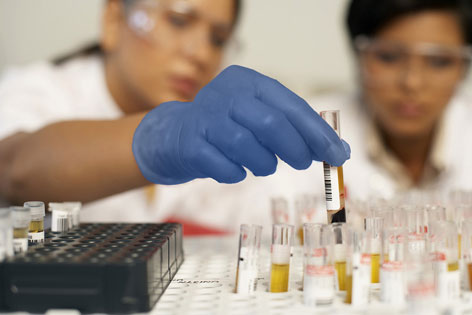 |
The hidden link
Laboratory Medicine is unseen by most patients, but its presence looms large
It’s a place most patients at UC Irvine Medical Center will never see – but it’s a critical component of their care. The new Laboratory Medicine Building at UC Irvine Medical Center is where scientists uncover critical information about patients’ conditions – it’s where testing occurs, answers are found, and fundamental research takes shape.
"In most hospitals the lab is an afterthought," claims Fred Lauzier, senior director, UC Irvine Healthcare Ancillary Services. "It gets put in a basement and rapidly outgrows its space." Not so, at UC Irvine’s new Laboratory Medicine Building.
Designed by laboratory pathologists, testing specialists, and architects with unique lab expertise, this innovative lab features expansive space equipped with the most advanced technology, lighting, communication infrastructure, security systems, and extensive ergonomic and traffic flow planning. It also exceeds industry standards in green design and construction and will soon receive the LEED Gold Certification, the highest honor awarded for meeting standards for efficient energy use and reducing harmful impacts on the environment.
Accredited by the College of American Pathologists, the laboratory is home to more than 250 technical specialists and experts, including licensed clinical lab scientists, pathologists, phlebotomists, blood donor recruiters and computer programmers and analysts. As such, it provides an advanced setting for medical education, a place where future pathologists and UC Irvine researchers work side by side to better understand the molecular and cellular mechanisms of disease.
"We host the only clinical laboratory scientist training program in Orange County,” says Lauzier. “Every year, we provide 10 students with written, didactic and practical training to become licensed clinical lab scientists – and they’re trained right in the lab, so they have access to the most advanced equipment and leading-edge professionals in the field."
UC Irvine’s Laboratory Medicine Building is the first in the nation to offer a novel diagnostic test for the HER-2 gene present in breast cancer patients. It’s also one of only a dozen or so labs in the country using microarray technology diagnostically to study gene expression in the development of disease. What’s more, UC Irvine’s Laboratory Medicine Building facilitates the use of state-of-the-art DNA sequencing platforms, which allow for the development and implementation of a wide range of new tests.
"We process one million lab tests every year and within each of those tests, we might have half a dozen results," says Lauzier. "That’s approximately 10 million pieces of information produced by our lab every year." Beyond the actual test result itself, trending and outcomes analysis are an important role for lab results.
What’s more, UC Irvine serves as a referral lab for skilled nursing facilities, state and county facilities, community clinics and hospitals, and clinical trial and research programs. Together, these outside providers represent about 23 percent of the lab’s total volume. In addition to these pathology services, UC Irvine also provides mobile radiology when requested. UC Irvine healthcare personnel travel to these providers to perform radiological procedures and collect specimens at the patients’ bedsides. The phlebotomists and technicians then transport patient samples and electronically transmit X-ray images to UC Irvine for analysis by our board-certified radiologists.
"The pathologists and laboratory technologists working here are essential to the high quality care we provide to our patients,” says Lauzier. “We are the only laboratory in Orange County to offer this level of advanced diagnostic technology combined with world class pathologists and radiologists."
